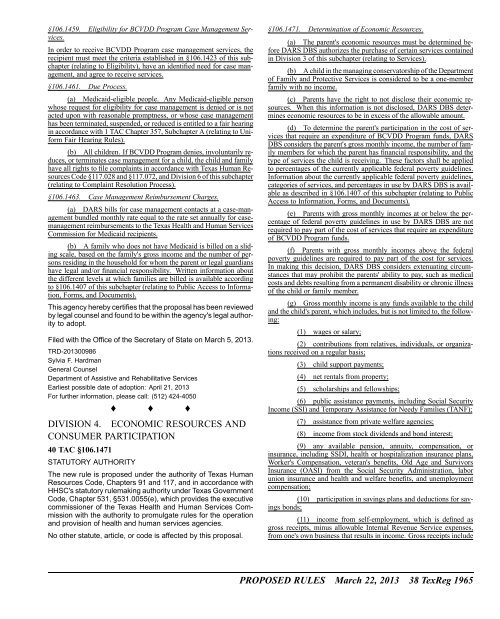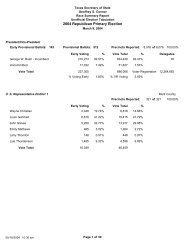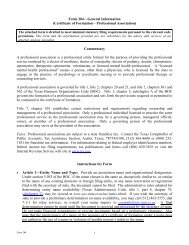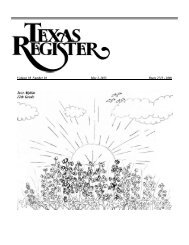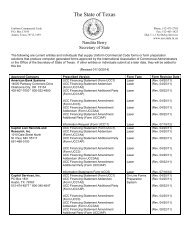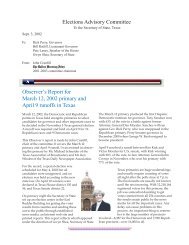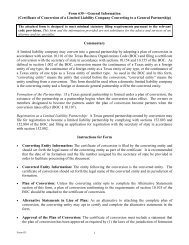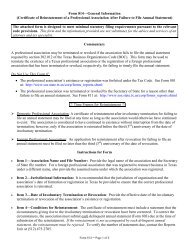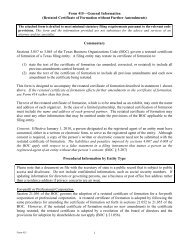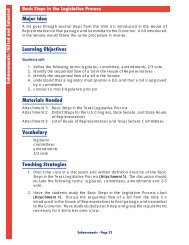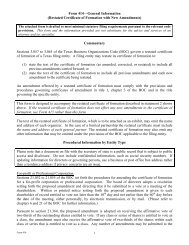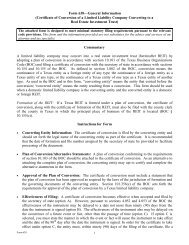March 22 issue (all sections) - Texas Secretary of State
March 22 issue (all sections) - Texas Secretary of State
March 22 issue (all sections) - Texas Secretary of State
Create successful ePaper yourself
Turn your PDF publications into a flip-book with our unique Google optimized e-Paper software.
§106.1459. Eligibility for BCVDD Program Case Management Ser-<br />
vices.<br />
In order to receive BCVDD Program case management services, the<br />
recipient must meet the criteria established in §106.1423 <strong>of</strong> this sub-<br />
chapter (relating to Eligibility), have an identified need for case man-<br />
agement, and agree to receive services.<br />
§106.1461. Due Process.<br />
(a) Medicaid-eligible people. Any Medicaid-eligible person<br />
whose request for eligibility for case management is denied or is not<br />
acted upon with reasonable promptness, or whose case management<br />
has been terminated, suspended, or reduced is entitled to a fair hearing<br />
in accordance with 1 TAC Chapter 357, Subchapter A (relating to Uniform<br />
Fair Hearing Rules).<br />
(b) All children. If BCVDD Program denies, involuntarily reduces,<br />
or terminates case management for a child, the child and family<br />
have <strong>all</strong> rights to file complaints in accordance with <strong>Texas</strong> Human Resources<br />
Code §117.028 and §117.072, and Division 6 <strong>of</strong> this subchapter<br />
(relating to Complaint Resolution Process).<br />
§106.1463. Case Management Reimbursement Charges.<br />
(a) DARS bills for case management contacts at a case-management<br />
bundled monthly rate equal to the rate set annu<strong>all</strong>y for casemanagement<br />
reimbursements to the <strong>Texas</strong> Health and Human Services<br />
Commission for Medicaid recipients.<br />
(b) A family who does not have Medicaid is billed on a sliding<br />
scale, based on the family's gross income and the number <strong>of</strong> persons<br />
residing in the household for whom the parent or legal guardians<br />
have legal and/or financial responsibility. Written information about<br />
the different levels at which families are billed is available according<br />
to §106.1407 <strong>of</strong> this subchapter (relating to Public Access to Information,<br />
Forms, and Documents).<br />
This agency hereby certifies that the proposal has been reviewed<br />
by legal counsel and found to be within the agency's legal authority<br />
to adopt.<br />
Filed with the Office <strong>of</strong> the <strong>Secretary</strong> <strong>of</strong> <strong>State</strong> on <strong>March</strong> 5, 2013.<br />
TRD-201300986<br />
Sylvia F. Hardman<br />
General Counsel<br />
Department <strong>of</strong> Assistive and Rehabilitative Services<br />
Earliest possible date <strong>of</strong> adoption: April 21, 2013<br />
For further information, please c<strong>all</strong>: (512) 424-4050<br />
♦ ♦ ♦<br />
DIVISION 4. ECONOMIC RESOURCES AND<br />
CONSUMER PARTICIPATION<br />
40 TAC §106.1471<br />
STATUTORY AUTHORITY<br />
The new rule is proposed under the authority <strong>of</strong> <strong>Texas</strong> Human<br />
Resources Code, Chapters 91 and 117, and in accordance with<br />
HHSC's statutory rulemaking authority under <strong>Texas</strong> Government<br />
Code, Chapter 531, §531.0055(e), which provides the executive<br />
commissioner <strong>of</strong> the <strong>Texas</strong> Health and Human Services Commission<br />
with the authority to promulgate rules for the operation<br />
and provision <strong>of</strong> health and human services agencies.<br />
No other statute, article, or code is affected by this proposal.<br />
§106.1471. Determination <strong>of</strong> Economic Resources.<br />
(a) The parent's economic resources must be determined before<br />
DARS DBS authorizes the purchase <strong>of</strong> certain services contained<br />
in Division 3 <strong>of</strong> this subchapter (relating to Services).<br />
(b) A child in the managing conservatorship <strong>of</strong> the Department<br />
<strong>of</strong> Family and Protective Services is considered to be a one-member<br />
family with no income.<br />
(c) Parents have the right to not disclose their economic resources.<br />
When this information is not disclosed, DARS DBS determines<br />
economic resources to be in excess <strong>of</strong> the <strong>all</strong>owable amount.<br />
(d) To determine the parent's participation in the cost <strong>of</strong> services<br />
that require an expenditure <strong>of</strong> BCVDD Program funds, DARS<br />
DBS considers the parent's gross monthly income, the number <strong>of</strong> family<br />
members for which the parent has financial responsibility, and the<br />
type <strong>of</strong> services the child is receiving. These factors sh<strong>all</strong> be applied<br />
to percentages <strong>of</strong> the currently applicable federal poverty guidelines.<br />
Information about the currently applicable federal poverty guidelines,<br />
categories <strong>of</strong> services, and percentages in use by DARS DBS is available<br />
as described in §106.1407 <strong>of</strong> this subchapter (relating to Public<br />
Access to Information, Forms, and Documents).<br />
(e) Parents with gross monthly incomes at or below the percentage<br />
<strong>of</strong> federal poverty guidelines in use by DARS DBS are not<br />
required to pay part <strong>of</strong> the cost <strong>of</strong> services that require an expenditure<br />
<strong>of</strong> BCVDD Program funds.<br />
(f) Parents with gross monthly incomes above the federal<br />
poverty guidelines are required to pay part <strong>of</strong> the cost for services.<br />
In making this decision, DARS DBS considers extenuating circumstances<br />
that may prohibit the parents' ability to pay, such as medical<br />
costs and debts resulting from a permanent disability or chronic illness<br />
<strong>of</strong> the child or family member.<br />
(g) Gross monthly income is any funds available to the child<br />
and the child's parent, which includes, but is not limited to, the following:<br />
(1) wages or salary;<br />
(2) contributions from relatives, individuals, or organizations<br />
received on a regular basis;<br />
(3) child support payments;<br />
(4) net rentals from property;<br />
(5) scholarships and fellowships;<br />
(6) public assistance payments, including Social Security<br />
Income (SSI) and Temporary Assistance for Needy Families (TANF);<br />
(7) assistance from private welfare agencies;<br />
(8) income from stock dividends and bond interest;<br />
(9) any available pension, annuity, compensation, or<br />
insurance, including SSDI, health or hospitalization insurance plans,<br />
Worker's Compensation, veteran's benefits, Old Age and Survivors<br />
Insurance (OASI) from the Social Security Administration, labor<br />
union insurance and health and welfare benefits, and unemployment<br />
compensation;<br />
(10) participation in savings plans and deductions for savings<br />
bonds;<br />
(11) income from self-employment, which is defined as<br />
gross receipts, minus <strong>all</strong>owable Internal Revenue Service expenses,<br />
from one's own business that results in income. Gross receipts include<br />
PROPOSED RULES <strong>March</strong> <strong>22</strong>, 2013 38 TexReg 1965


